If you spend much time reading about fly fishing, or hanging around with other fly fishers, you’re likely to run across a common theme in our sport.
“We false cast too much. Stop it.”
That admonition to limit or curtail our false casting is frequently followed with a bit of home-spun angling wisdom. “You won’t catch fish with your fly in the air. False casting is a waste of your time. Get your fly in the water.”
Sounds like great advice, doesn’t it? Stop false casting. Make sure you fly is on, or in, the water. Catch more fish.
Except it’s not great advice. For lots of folks it’s incredibly counterproductive. So let’s take a closer look at our false casting.
Why do we false cast? There are six main reasons. Here are the first five:
- False casting allows us to lengthen, or shorten, our line.
- It also allows us to change the direction of our cast — let’s, for example, say we’ve picked a new target — without putting our line on the water.
- It helps us measure the distance of our cast in comparison with our target.
- It dries off our dry flies.
- It can eliminate line spray before our presentation cast. (Which is why we frequently false cast to the left or right of our target.)
All five of those reasons are valid and important to our angling. Any fly fisher worthy of the name needs to change the length of his or her cast, as well as the direction, on a regular basis. We all hope to cast the right length of line. Our dry flies definitely need to float. And none of us should want to spook fish by throwing a cascade of water droplets in their direction.
There are two other points I should make. The first regards the ubiquitous “keep your fly in the water” truism I mentioned above.
Everything else being equal, a fly that’s always on the water will outperform a fly that’s on the water less frequently. But everything else is rarely equal. The fly fisher who casts occasionally but fishes effectively will invariably out-fish the person whose fly is constantly in the water but who lacks basic angling skills.
If we hope to catch more, or bigger, fish, we should focus on improving our angling. The amount of time our fly spends on the water is a secondary concern.
My final point — and I’m not sure how to say this without offending at least a few people — is that for many of us, fly fishing isn’t about conforming to some unexamined and counterproductive norm. It’s not about bowing to the conventional wisdom. It’s about enjoying our time on the water.
Fly fishing should be fun. So should fly casting. So when someone, regardless of their credentials or their opinion of themselves, tells you that you’re doing it wrong — that you’re false casting too much — they’re trying to impose their narrow, dogmatic views on your angling.
John Juracek, who writes on occasion for Hatch and who, in addition to being one of the finer anglers on the planet, is an instructor at the School of Trout, said it beautifully some years ago.
“Take a few minutes and watch a good fly caster. What you’ll see is someone in complete and total control of their medium. You’ll feel the grace, the elegance and the beauty inherent in their smoothly unrolling line. Good casting should be a matter for conscious enjoyment, celebration even, never something to be overlooked or dismissed as merely the mechanism by which we deliver our fly to a target. After all, isn’t it the casting itself that separates fly fishing from other forms of angling? If we can’t celebrate that, why fly fish in the first place? There are other, more efficient ways to bring fish to hand.”
I mentioned up above that there are six reasons to false cast. John’s quote illustrates the last one perfectly. We false cast because it’s an important part of our fly fishing — an intrinsic part — and because it adds tremendously to our enjoyment of the sport. If you don’t want to false cast, then you don’t need to. But please don’t allow the false casting police to dictate the way you fish. At the end of the day, fly fishing should put a big smile on your face. Don’t let anyone steal that from you.



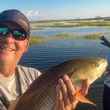





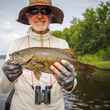
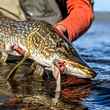

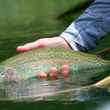

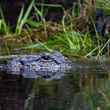




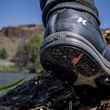
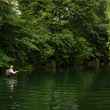

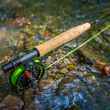


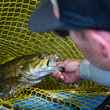
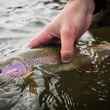

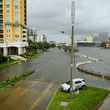

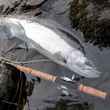
Comments
Derek replied on Permalink
I really enjoyed this article. Like most things in life; If you enjoy it - do it. And do it your way that allows you to harness that enjoyment. Very well said.
Rick B. replied on Permalink
On-point brilliant. Thank you.
Cindy Lange replied on Permalink
Beautifully written!
Dax Messett replied on Permalink
This is an absolutely superb piece, in every way. This should be mandatory reading for everyone who picks up a fly rod...especially guides who have the opportunity to introduce many newbies into the discipline. It's a shame to see fly fishing turn into a numbers game for many of the guides who use fly rods. A lot of folks out there just use a fly rod to water load a leaded bobber rig with plastics on the end it, side drift for hundreds of yards, and bumble their way into fish. They will catch plenty of fish this way, without even knowing or caring how to make an effective overhead cast or set up an actual angling presentation.
I don't care if I sound old and bitter...but I guess I am because it is disrespectful towards the craft, culture, history, other anglers, and most importantly the fish...and to a smaller extent...themselves.
Cheers!
Scott replied on Permalink
Have you ever been a guide?
Matt replied on Permalink
There one more reason that false casting is important - I’ll often false cast until I get the rhythm of the fish I’m targeting so I can drop my fly to the target in time with the rise.
Scott replied on Permalink
Seeing on paper means it's real. I agree...it's fun but catching a fish is more fun.
Mark Hayes replied on Permalink
This article stated my POV perfectly! You gotta dial in your distance and you gotta dry your fly. Very well written Todd! Thanks!
Kerry replied on Permalink
Well said!!! A thorough catalogue of reasons to fling. Although, newer fishermen often false cast excessively to their detriment. Many of those false casts are better than the real thing.
Andy Meng replied on Permalink
Very well written. I’ve never understood why people criticize false casting. I LOVE false casting and agree with every point you make. I also false cast to develop the power and force needed to overcome a strong wind.
Al replied on Permalink
Thanks Todd, this needed saying. As fly fishers, of course we want to catch fish. We want more fish, bigger fish, better fish, whatever. But mostly, we want to enjoy all the moments up to and including that fish — the planning, the going, the stringing up, the decisions. And then, finally, that beautiful, graceful liberation of the fly line taking our dreams out to where the trout live.
Anonymous replied on Permalink
False cast to your hearts content, but if that line crosses the fish's cone of vision-it sees it.
Jon replied on Permalink
Thank you for going against the grain on this. I generally agree although I do find I could typically use 1 less false cast to get the job done and avoid another opportunity for error.
GARY SULLIVAN replied on Permalink
I was casting over a small lake a short drive from Denver with my sweetheart watching me from a distance, peacefully enjoying the scene. I was doing some false casting to get my loop properly looping, and I was doing a fair job of it. There were no fish, though,lol. Later, she told me how fascinating and beautiful it was to see the fly line float back and forth.
I tell this story because it's a beautiful sport for others to watch.
Frank Lowry replied on Permalink
I never felt like the "false casting police" were after me. I always felt like the the advice was meant to help me, and it has. I catch more fish by limiting my false casting.
Pages